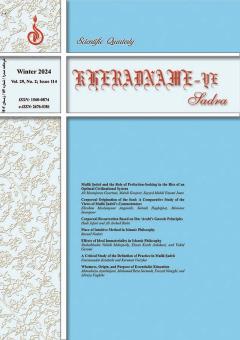-
-
List of Articles
-
Open Access Article
1 - Editor's Note
S. Mohammad Khamenei -
Open Access Article
2 - Mullā Ṣadrā and the Role of Perfection-Seeking in the Rise of an Optimal Civilizational System
Ali Mostajeran Goortani Mahdi Ganjvar Seyyed Mahdi Emami Jome -
Open Access Article
3 - Corporeal Origination of the Soul: A Comparative Study of the Views of Mullā Ṣadrā’s Commentators
Ebrahim Moslempour Angarabi Sohrab Haghighat Mansur Imanpour -
Open Access Article
4 - Corporeal Resurrection Based on Ibn ‘Arabī’s Gnostic Principles
Hadi Jafary Ali Arshad Riahi -
Open Access Article
5 - Place of Intuitive Method in Islamic Philosophy
Rasoul Naderi -
Open Access Article
6 - Effects of Ideal Immateriality in Islamic Philosophy
Shahabbodin Vahidi Mehrjardy Ehsan Kordi Ardakani Vahid Gerami -
Open Access Article
7 - A Critical Study of the Definition of Practice in Mullā Ṣadrā
Fatemeh Sadat Ketabchi Keramat Varzdar -
Open Access Article
8 - Whatness, Origin, and Purpose of Essentialist Education
Ahmadreza Azarbayejani Mohammdreza Sarmadi Faezeh Nateghi Alireza Faghihi
-
The rights to this website are owned by the Raimag Press Management System.
Copyright © 2017-2026







